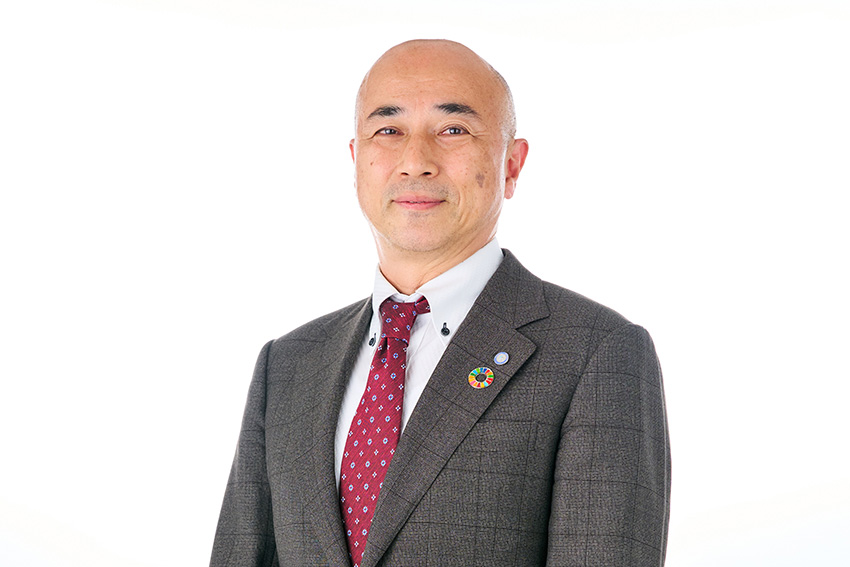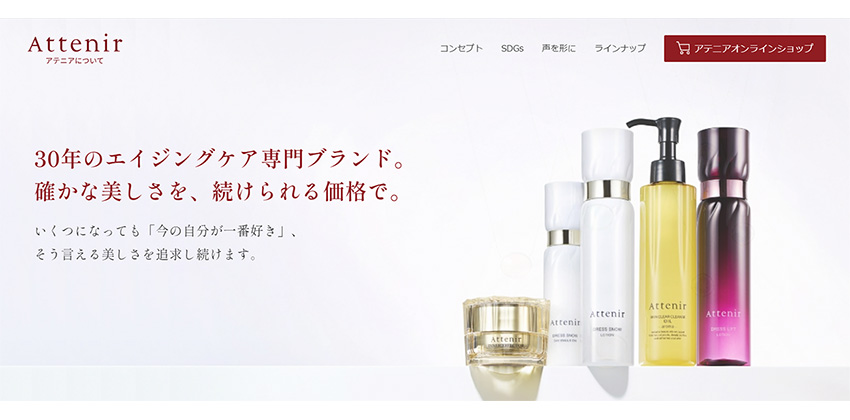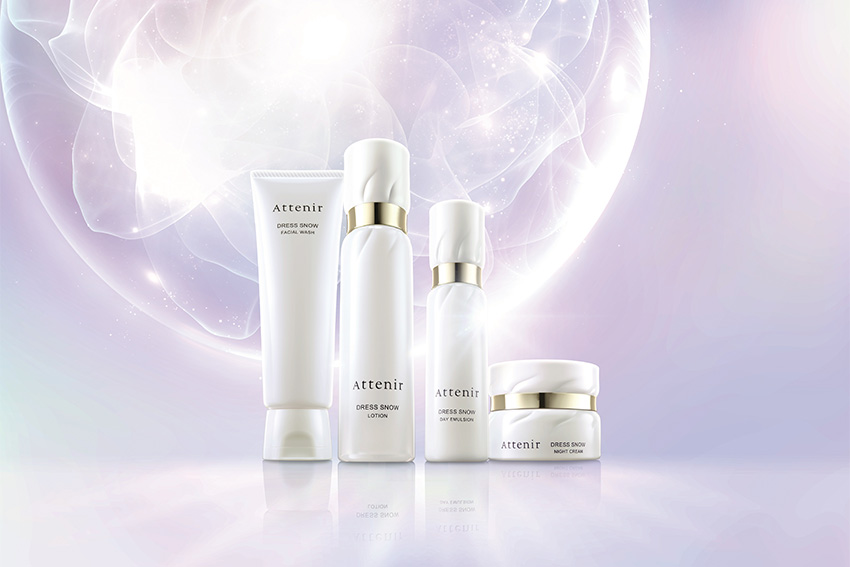Attenir is providing customers with affordable beauty, making their customers say, “I love who I am now.”

Could you start by giving us a quick introduction to your company and the background behind its establishment?
Our company was founded because our founder believed that we could provide high-quality cosmetics at a reasonable price point. To give you some background, at the time, the Japanese economy was in the midst of a bubble period, and prices were on the rise. At that time, we saw that the prices of scarves of the same quality varied many times over, depending on whether or not they had a brand name, and we vowed to sell cosmetics of high quality at prices that we customers could continue to afford.
Our company's philosophy is to solve our customers' negativity, so providing quality cosmetics that are more affordable and accessible means overcoming our customers' negativity.
J-Beauty brands have historically faced stiff competition from Western brands as well as the upcoming K-Beauty industry with their strong marketing capabilities, but something that not a lot of people know is that a lot of the active ingredients in these products are made in Japan by Japanese manufacturers. Also, there is a shift in consumer preferences towards the Japanese mindset of “less is more,” and ethically sourced ingredients. What do you believe are the advantages of J-Beauty brands over other competitors?
I agree, and the K-beauty industry today is characterized by enormous marketing power. Even in Japan, K-Beauty is now sold in convenience stores all over Japan, making it so familiar to the younger generation.
Conversely, J-Beauty's weakness may be its weak marketing power. I believe that Japanese brands are second to none in terms of manufacturing quality, especially considering the attention to detail and the time spent on development. In fact, Japanese manufacturers have an advantage in developing high-quality, high-performance, yet easy-to-use products, rather than just following trends.
Another uniqueness is that each J-Beauty brand has its own R&D capabilities, and every brand searches for new types of active ingredients to enhance the quality of its products. With its own R&D center and production facilities, J-Beauty runs a comprehensive product cycle in-house. This allows us to conduct our own dermatological and DNA research. Currently, our international business is centered on e-commerce in China, and our Chinese customers tell us that our products are easy to use, very comfortable, and that they love the textures. All this feedback is important and is taken into account in every detail during further product development.
Today Japan is the oldest society in the world and it is expected that in 15 years more than 35% of the population will be over the age of 65. Obviously, this poses a series of challenges in terms of a shrinking domestic market and a labor crisis, but at the same time, it presents opportunities for cosmetics and beauty brands to cater to this aging demography. Interestingly, Japan isn’t the only nation facing this problem, with other advanced nations including Korea, Germany, Italy, China, and the US all beginning to age rapidly. What are the challenges and opportunities presented by Japan’s aging population?
Since our founding, we have focused on anti-aging research. Our target audience is women in their 40s, but with the rapid aging of the population, we see greater opportunities for our company. The younger generation will gravitate toward K-beauty brands, while the older generation will move on to brands like ours.
Since we have been in business for more than 30 years, the average age of our users is gradually increasing. It is important for us to develop new products targeting this average age group.
At Attenir, we pride ourselves on providing consumers with high quality products at reasonable prices. We want people who have been committed to staying in touch with their desire to be beautiful as they age to be in our range, and we want them to be exposed to higher quality and more reasonably priced products.
We conduct blind tests with high brands, hiding them so that our customers do not know which brand they are. Compared to the top brands, our products have received excellent reviews. To be honest, our weakness is still our marketing capabilities; as a B2C brand, it is important to raise people's awareness. While other companies spend a lot on advertising, we spend more on research, development, and manufacturing and less on advertising.

Attenir Online Shop homepage
On average your products are around 30% cheaper than similar products. How are you able to achieve that cost reduction when compared to similar products?
One reason is that we are cutting back on our advertising budget. Since we are a B2C brand, we tend to rely on direct sales and we want to increase awareness, but at the same time we are holding back on advertising.
Attenir was established under the FANCL umbrella. Could you tell us a little bit about some of the synergies and advantages of being part of FANCL?
First, FANCL and Attenir share the same R&D center, so quality is maintained at the same level. FANCL's cosmetics do not contain any additives, but Attenir's cosmetics contain additives to the extent that they do not adversely affect the skin. Back office functions such as human resources and general affairs are shared between the two companies and are owned by Fancl. I think the main advantage of this small number of employees is that it allows for flexibility and makes it easier to achieve sales targets.
Could you tell us which particular R&D projects your team is most excited about right now?
With the growing awareness of the SDGs, people's attitudes have also changed. I feel that the biggest difference between Japanese beauty and European beauty is that while Europe has focused on external beauty and beauty through makeup, Japanese beauty has focused on bringing out the natural beauty of the skin and making it last longer. J-Beauty's strength is its emphasis on technical and natural aspects for quality. These must be good competitive points against foreign brands.
Production is returning to Japan, partly due to cyclical changes caused by the weak yen. In the past, production was outsourced as the economy grew, but now is the time for Japan's high quality to return to production.
Your firm began with skincare and aging solutions before moving into certain makeup products. After this you expanded into health foods and supplements. Why did you make the decision to move from outer beauty towards products that cater to inner beauty?
FANCL's basic philosophy is to provide holistic beauty both inside and out. The same is true for the product development philosophy of ATTENIR. One of the most popular products is cleansing oil, which not only removes makeup thoroughly but also acts as a beauty essence.
Sustainability is a core element of your products, with your company showcasing eco-packaging and caps made out of recycled resin. In a recent survey in Newsweek Magazine, one in three consumers was ready to pay 20% more for a product that is sustainable. Could you tell us a little more about some of your company’s sustainability practices? How are you changing your packaging or your product development in order to comply with environmental standards?
It has been 20 years since we launched our environmentally friendly product line. Our recently renewed lotion and other products include the first smart pouch type refill in the cosmetics industry. Unfortunately, there was some concern because they are not very fancy looking, but we are now very confident that our customers support this product. For product boxes, we will switch that box to Forest Stewardship Council (FSC) certified paper by 2025. The FANCL Group as a whole is actively working to promote sustainability.
In cooperation with beverage manufacturers, we collect caps for use in our products. The majority of our products are designed in such an environmentally friendly manner, and we always incorporate a sustainable approach when we change the model of our products. The FANCL Group's goal is to achieve zero CO2 emissions by 2050. Palm oil is considered sustainable in the cosmetics industry, and with this in mind, we aim to replace 100% of the oil used in our products with sustainable palm oil by March 2024.
Sustainability is more than a buzzword in the cosmetics field and these days we are seeing very strong consumer demand for sustainable brands. FANCL was a pioneer in removing microplastics from creams and other types of cosmetic products. When you look at the future, this is definitely a big trend across the world, especially in terms of the development of organic and natural products. If we look at the next 5 years, what do you think will be the new growth drivers, and what new trends do you anticipate will play an important role in your product development?
Attenir's ingredients are chosen for their natural origin.
How important is internationalization for your company and are there any other markets that you seek to expand into?
Attenir's current strategy is focused on the Asian market, and while we currently have a cross-border e-commerce channel in China, we are also moving to establish comprehensive trading capabilities in China. We currently have e-commerce operations in Singapore, Malaysia, Taiwan, and Hong Kong, and are looking to expand around these markets.
When you look at skin types of people in Singapore and Malaysia they tend to have darker complexions than Japanese skin. There are also differences in beauty standards, so consumer marketing has to be adapted. How do you ensure that your product development can meet the demands of local markets?
I cannot disclose completely, but we make attempts to understand local markets by having group interviews regarding the product usage. We carry out these questionnaire interviews across multiple countries. As a market grows we look to provide formulas that cater to the specific market.

A variety of skincare products offered by Attenir
You mentioned earlier that one of your big strengths is your direct selling strategy, but you understood that you need to invest more in branding, which is difficult to achieve due to keeping your competitive advantage. When you expand into countries where your company doesn’t have a track record, how can you overcome this marketing challenge? Do you have the same direct strategy or are you also investing in your image in order to spread word of your brands to countries where you don’t yet have a presence?
First and foremost, we won't be alone, we will take a group wide global approach. It depends on the market whether Attenir or FANCL is prioritized, but the sure point will be that we will invest in marketing. We are still contemplating whether we should have a direct run store or work with local agents. We are ready to make investments into marketing despite marketing being a bit of a weak point for us.
The FANCL group does have overseas bases in Shanghai and Singapore, so we are looking to leverage those bases and expand further.
Imagine that we came back on the very last day of your presidency and had this interview all over again. What goals or dreams do you hope to achieve by the time you are ready to pass the baton onto the next generation of Attenir executives?
It's about satisfying all stakeholders. Those stakeholders include FANCL, staff, shareholders, and their families. We hope that everyone involved with Attenir will feel happy to be a part of this company.
For more information, visit their website at: https://www.attenir.co.jp/
0 COMMENTS